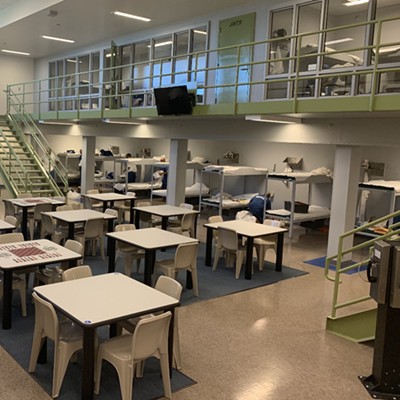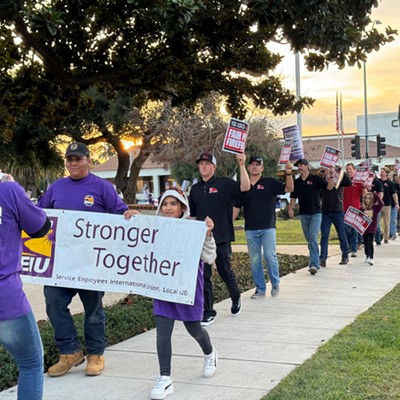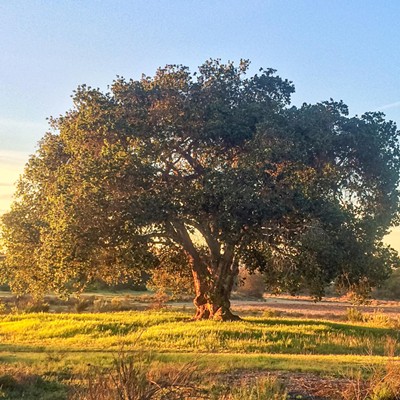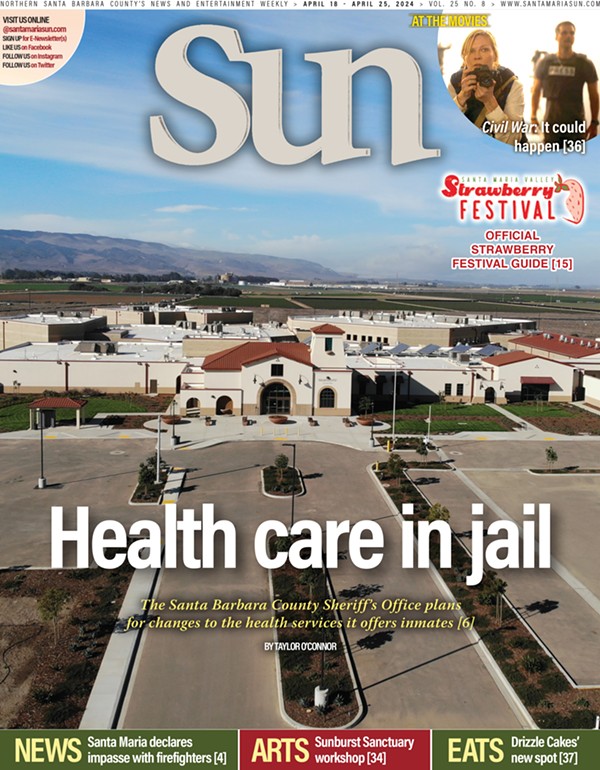Rows of green-topped fields are a staple on the Central Coast, and as soon as red starts showing up between the forest-colored leaves, those acres flood with workers running empty boxes to spots where they hover with hands that deftly seek out tart, sweet berries the color of blood. It’s part of the landscape, commonplace, so blended into the sights of every day that the scene blows by your periphery as you drive, lost in thoughts you can’t see with your eyes.
Those strawberries hit the shelves of local grocery stores with sale-gale force, stacked up front with clamshells full of raspberries, blueberries, and blackberries as you walk through the sliding doors at Vons or Albertsons. The berries are from Watsonville, Santa Maria, Oxnard, and Mexico. It’s a massive industry, with telltale rows that propagate beyond the byways of Coastal California, miles south of the San Diego/Baja California border. But does the picture of laboring workers look the same where we can’t see it?

Two months of protests, calls for boycotts, and claims of labor strife in the berry fields of Baja say no: The fields are unrecognizable beyond the labor laws of the United States.
Jornaleros, or strawberry pickers, in the valley of San Quintin say they’re paid poverty wages; do not enjoy time off, sick leave, overtime, retirement, health care, or other social security benefits; endure verbal and sexual abuse by foremen who turn a blind eye to child labor; and, at the worst farms, live in squalid, subhuman conditions where they’re effectively corralled by barbed wire and armed guards.
One San Quintin picker identified as Perfecto told Reuters that if workers are sick or injured in the fields they are sometimes docked a day’s wages.
“You keep quiet, and you keep working covered in blood,” he told Reuters about the working conditions.
On May 14, farmworkers in Baja California and the Mexican government negotiated for 18 hours. The sides reached a tentative agreement that would boost wages and guarantee government-required benefits to thousands of laborers, according to the The LA Times. The government conceded to cover part of workers’ wages and work with growers to bring pay “as close as possible” to 200 pesos a day. It also pledged improved access to social security benefits for workers.
“I don’t think the government wants to give the impression that it’s a repressive force,” strawberry picker Justino Herrera told The LA Times. “All of Mexico is behind us, supporting our movement.”
The deal may end the months of unrest. Strikes, highway closures, and violent clashes between state police and tens of thousands of protesting workers have rocked the region and led to hundreds of injuries and arrests.
One company in particular has been targeted by the movement: Driscoll’s, perhaps the biggest berry distributor in the world. Started in Watsonville and with offices in Oxnard, Driscoll’s operates in at least 55 countries globally and controls between a fourth and a third of the market. The berry giant works with more than 125 independent growers in California—including between one and two dozen growers and a processing plant in the Santa Maria Valley.
“There are literally thousands of children working in those fields, and these are American companies based on the Central Coast,” said local LULAC (League of United Latin American Citizens) organizer Pedro Reyes of the Baja-based fields. “Locally, there are a lot of people who have come together to say, ‘Look, we’re in support of those workers out there, and we also question the ethics of those major corporations.’”
Reyes has participated in several protests against the berry producer on the Central Coast and feels that labor standards should be the same across the board, whether U.S.-based companies like Driscoll’s are operating or working with suppliers based out of the country or on U.S. soil.
Driscoll’s has 13 suppliers in the Pacific Northwest, and they buy from more than 10 “independent growers” in Mexico. About 80 percent of Driscoll’s Mexican product comes from their affiliate Berrymex. Jornaleros working for that affiliate claim they don’t earn $5 to $9 an hour, as Berrymex has said, but between $3 and $3.50. Those workers say if they take a Sunday off, they’re docked up to $20 and aren’t allowed to return to work until Wednesday. Berrymex CEO Hector Lujo denied the claims. Reuters interviewed several workers who showed the news service pay slips with earnings between 782 and 1,210 pesos a week, which works out to much less than Berrymex’s assertions about their berry-picking employees’ “earning opportunity.”
Berrymex has agreed to bigger wage hikes than other companies in the region, according to The LA Times, and has provided workers with some social security benefits. Although labor leaders acknowledge that, they still say Driscoll’s “shortchanges workers on some required benefits, imposes onerous work quotas, and exaggerates its wage levels.”
In Santa Maria, picketers called for a boycott of Driscoll’s berries outside the Strawberry Festival in late March. The weekend of May 16, protestors outside the Strawberry Festival in Oxnard renewed the call for a boycott, adding their voices to calls from Watsonville, San Jose, Salinas, Greenfield, Sacramento, Ventura, Los Angeles, and San Diego to urge consumers and suppliers to stop buying their berries.
The United Farm Workers of America (UFW) circulated a petition demanding that large grocery retailers such as Walmart, Kroger, and Target “hold their Baja suppliers accountable.” More than 10,000 consumers asked the company to stop doing business with the farms in question until an agreement is reached, according to Working in These Times. Retailers from Portland to Philadelphia have reportedly stopped selling Driscoll’s berries.
Worker unrest is not new to Driscoll’s. A boycott against the company’s Washington supplier Sakuma Farms made national headlines in 2013. But the last two months of massive walkouts and protests are the largest in decades.
Strawberries and Oaxaca
Strawberries reign supreme in Santa Barbara County, which has an agricultural industry that hauled in $1.5 billion dollars in 2014. About a third of that came from strawberries—far and away the most lucrative crop in Santa Maria and the state.
But berries weren’t always the top crop. Eric Schlosser (journalist and author of Fast Food Nation and Reefer Madness) wrote that in the mid-70s, there were only 800 acres of strawberries in the Santa Maria Valley. By 1996 that number had multiplied by seven. High-value specialty crops, like the strawberry, are now the most profitable segment of California’s agriculture. Strawberries are delicate and costly to grow, but can yield more revenue per acre than any other crop—except marijuana.
According to Schlosser, growers can reap between $10,000 and $20,000 an acre growing strawberries. The cost of production ranges from $12,000 to $30,000 an acre. Fixed costs are inflexible, so the only cost a grower can exert any real control over is the cost of labor.
The side effects of that labor, as reported by NPR, include knee pain, slipped disks, type 2 diabetes, and premature births. Exposure to pesticides can cause rashes and skin discoloration. Workers spend all day stooping over rows in the hot sun; strawberry plants grow between 1- and 4- inches tall on beds raised between 10 inches and a foot.
According to Tomás Madrigal, a UCSB researcher who works in the Chicana and Chicano Studies department, to understand where many of those workers come from, we need to travel to southern Mexico. The boom of the strawberry industry happened as the economy in the Mexican state of Oaxaca collapsed and thousands of indigenous farmers were displaced.
One architect of this change was Arturo Warman, a Mexican anthropologist who masterminded a series of land reforms to displace small farmers to the cities in the hope of modernizing the Mexican economy. Soil erosion and declining crop yields put further pressure on the Oaxaqueño subsistence farmers.
The second blow came with the passage of the North American Free Trade Agreement, sweeping away trade barriers and tariffs between Mexico and the United States. Cheap U.S. corn cut loose by NAFTA flooded the market, and those subsistence farmers who remained found they had no means by which they could make a profit. Indigenous Oaxacans, many of them Triqui or Mixtec, were displaced farther north and west—to the strawberry fields of Baja California and the United States—seeking work.
“Less land available, and the low price of corn, created a crisis where they were selling their labor instead of their corn. A lot of farmers became farmworkers,” Madrigal said.
San Quintin
Many of those indigenous farmers-turned-farmworkers ended up in the sleepy coastal valley of San Quintin, where fruit and berry pickers number around 60,000 during the peak of the season. Before strawberries, San Quintin was dominated by unregulated tomato production, which sucked up so much groundwater that saltwater intrusion rendered many aquifers near undrinkable, according to Santa Ynez native Marcos Lopez, who teaches sociology and anthropology at Bowdoin College. The Mexican state built reverse-osmosis plants for desalination and charged consumers with the difference, leaving many residents unable to pay for water.
“This place has absolutely no water,” Lopez said. “They found a way to overcome that barrier. But the people who work there have no water.”
Communities of workers organized against the state to try and keep the water rates down.
In the 1990s, migrant communities of farmworkers became permanent colonias. It’s from those colonias that Driscoll’s encountered mass organizing in March 2015. Some guessed about 40,000 workers—about half of the labor force—weren’t in the fields when the strike began in mid-March. Workers occupied government buildings and blocked 56 miles of the Transpeninsular Highway, by which fruit is transported to the United States. News reports said in clashes with protestors, police responded with tear gas, bean bag projectiles, and hundreds of arrests.

Francisco “Kiko” Vega, the governor of Baja California, came out in defense of the growers. “What do the producers say?” he asked Milenio Televisión rhetorically on March 26: “300 pesos exceeds what they can pay, considering the price of harvesting, factors like supply and demand—considering the investments. What I’d like to see is 300 or 400 pesos—whatever is possible and necessary for these people to have a better quality of life—that’s what we want, but we have to be realistic.” Mexican senators called for a human rights investigation.
Negotiations between the government and growers stalled on May 8, when prominent government officials failed to show up for scheduled negotiations. The Transpeninsular Highway was once again blocked. Protests turned violent in the colonia of Vincente Guerrero, where Mexican news site El Milenio reported local residents took up arms to defend their homes and businesses, and a group of delinquents attempted to set fire to a local farm.
The police again responded assertively, pursuing suspects as they fled into neighborhood houses and using their batons and bean bag projectiles against sleeping women and children, reported La Jornada. In response, two police cars, a RHYNO armored personnel carrier, and a municipal police station were bombarded with rocks and Molotov cocktails before catching fire. When the dust settled, 36 people were arrested and more than 70 injured. Seven were gravely injured, with women and a child as young as 7 years old claiming they’d been attacked by the police. Three officers sustained injuries as well.
“We did not do this,” jornalero spokesman Rafael Ramirez told Mexican news outlet SinEmbargo. “They were third parties who are not involved with the cause that we’re fighting for.”
Driscoll’s speaks out
Driscoll’s VP Soren Bjorn spoke with the Sun to address the allegations against his company.
“It’s a deliberate strategy of protest,” he said. “By going after Driscoll’s you can get to consumers and customers, and the consumers and customers will in turn facilitate change. Unfortunately, they don’t care about the collateral damage in the process.” He asserted that the worst allegations leveled against Driscoll’s weren’t true portrayals of the company’s Berrymex suppliers in San Quintin.
Driscoll’s, he said, conducts annual audits of the growers they buy from in Mexico. They check for food safety and quality and are conducted through third-party auditors contracted by the company. The audits also check to see if suppliers are in compliance with the Workplace Welfare Agreements, the sections of their contract with Driscoll’s that enumerate minimum living and working conditions on their farms.
Although he would not elaborate on the specifics spelled out in the agreements, he did remind the Sun of the zero-tolerance violations for which suppliers are immediately terminated. Those violations are spelled out on Driscoll’s website: child labor, forced labor, human trafficking, coercion, abuse, or health and safety conditions that pose an immediate risk to life and limb.
For suppliers that are neither in compliance with the Workplace Welfare Agreement or in violation of a zero-tolerance condition, Bjorn said Driscoll’s looks to push the supplier to improve the working conditions. “We’ll be back in a few weeks, and you need to demonstrate that it’s been fixed,” he said. “You work with a grower, and you want everything to improve.”
Staff Writer Sean McNulty can be reached at [email protected].











